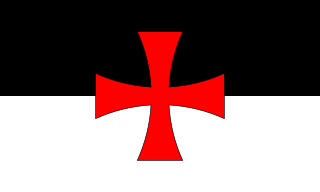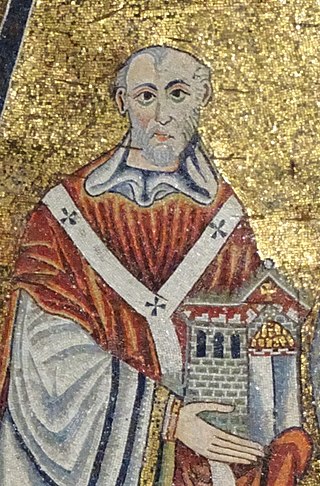
The Poor Fellow-Soldiers of Christ and of the Temple of Solomon, mainly known as the Knights Templar, was a French military order of the Catholic faith, and one of the wealthiest and most popular military orders in Western Christianity. They were founded c. 1119 to defend pilgrims on their way to Jerusalem, with their headquarters located there on the Temple Mount, and existed for nearly two centuries during the Middle Ages.

Pope Innocent II, born Gregorio Papareschi, was head of the Catholic Church and ruler of the Papal States from 14 February 1130 to his death in 1143. His election as Pope was controversial, and the first eight years of his reign were marked by a struggle for recognition against the supporters of Anacletus II. He reached an understanding with King Lothair III of Germany, who supported him against Anacletus, and whom he crowned as Holy Roman Emperor. Innocent went on to preside over the Second Council of the Lateran.

The Council of Vienne was the fifteenth ecumenical council of the Catholic Church and met between 1311 and 1312 in Vienne, France. This occurred during the Avignon Papacy and was the third and last ecumenical council to be held in the Kingdom of France. One of its principal acts was to withdraw papal support for the Knights Templar at the instigation of Philip IV of France. The Council, unable to decide on a course of action, tabled the discussion. In March 1312 Philip arrived and pressured the Council and Clement to act. Pope Clement V passed papal bulls dissolving the Templar Order, confiscating their lands, and labeling them heretics.
Milites Templi was a papal bull issued by Pope Celestine II in 1144.
Militia Dei is a papal bull issued by Pope Eugene III on 7 April 1145 that consolidated the Knights Templar's independence from local clerical hierarchies by giving the Order the right to take tithes and burial fees and to bury their dead in their own cemeteries. The Knights were allowed to travel through Europe freely.

Robert de Craon or Robert Burgundio was the second Grand Master of the Knights Templar from June 1136 until his death. He was instrumental in getting papal sanction for the Templar Order, making it independent from ecclesiastical and secular authorities. Robert negotiated the expansion of the Order into the Iberian peninsula with the acquisition of castles and territory. He died on 13 January 1149 and was succeeded by Everard des Barres.

Everard des Barres was the third Grand Master of the Knights Templar from 1147 to 1152.
The Poor Fellow-Soldiers of Christ and the Temple of Jerusalem, or Templars, was a military order founded in c. 1120.
Pastoralis praeeminentiae was a papal bull issued by Pope Clement V on 22 November 1307 to all Christian monarchs. It ordered the arrest of all Knights Templar and to seize their properties on behalf of the church. Clement was forced to support the campaign against the Templars by Philip IV of France, who owed them a great deal of money and had initiated the first arrests against the Templars on 13 October 1307.
Vox in excelso is a bull issued by Pope Clement V on 22 March 1312. The directives given within the bull were to formally dissolve the Order of the Knights Templar, effectively removing papal support for them and revoking the mandates given to them by previous popes in the 12th and 13th centuries.
In view of the suspicion, infamy, loud insinuations and other things which have been brought against the order ... and also the secret and clandestine reception of the brother of this Order; in view, moreover, of the serious scandal which has arisen from these things, which it did not seem could be stopped while the Order remained in being, and the danger to faith and souls, and the many horrible things which have been done by the very many of the brothers of this Order, who have lapsed into the sin of wicked apostasy, the crime of detestable idolatry, and the execrable outrage of the Sodomites ... it is not without bitterness and sadness of heart that we abolish the aforesaid Order of the Temple, and its constitution, habit and name, by an irrevocable and perpetually valid decree; and we subject it to perpetual prohibition with the approval of the Holy Council, strictly forbidding anyone to presume to enter the said Order in the future, or to receive or wear its habit, or to act as a Templar.

Ad providam was the name of a Papal Bull issued by Pope Clement V in 1312. It built on a previous bull, Vox in excelso, which had disbanded the order of the Knights Templar. Ad providam essentially handed over all Templar assets to the Hospitallers, with the exception of some resources which were left to provide pensions to some Templars who had escaped execution and converted to a monastic life.
Malcolm Charles Barber is a British medievalist. He has been described as the world's leading living expert on the Knights Templar. He is considered to have written the two most comprehensive books on the subject, The Trial of the Templars (1978) and The New Knighthood: A History of the Order of the Temple (1994). He has been an editor for The Journal of Medieval History and written many articles on the Templars, the Cathars, various elements of the Crusades, and the reign of Philip IV of France.
Datum is, from its Latin origin, a singular form of "data", and may refer to a single item of data.

In 1307, members of the Knights Templar in the Kingdom of France were suddenly charged with heresy and arrested after their leader, Master Jacques de Molay, had recently come to France for meetings with Pope Clement V. Many, including their leader, were burned at the stake while others were sentenced to perpetual imprisonment. The events in France led to a series of trials in other locations, not all of which had the same outcome.
William of Malines was a Flemish priest who was the Prior of the Church of the Holy Sepulchre from 1127 to 1130 and was then Latin Patriarch of Jerusalem from 1130 until his death. He is sometimes called William I to distinguish him from William of Agen, second patriarch of that name, but he was the second William to serve as prior of the Holy Sepulchre after William the Englishman.
Faciens misericordiam was a papal bull issued by Pope Clement V on August 12, 1308, as part of the trial against the Knights Templar. It called for a new Ecumenical council to be held in 1310, and set out some structure for the collection of depositions from the arrested Templars.

Pie postulatio voluntatis is a papal bull issued on 15 February 1113 by Pope Paschal II, in which the Pope formally recognized the establishment of the Knights Hospitaller and confirmed their independence and sovereignty. Today, the document is preserved at the National Library of Malta in Valletta, Malta.
The Council of Troyes was convened by Bernard of Clairvaux on 13 January 1129 in the city of Troyes. The council, largely attended by French clerics, was assembled to hear a petition by Hugues de Payens, head of the Knights Templar. Pope Honorius II did not attend the council, sending the papal legate, Matthew, cardinal-bishop of Albano. The council addressed issues concerning the Templar Order and a dispute between the bishop of Paris and king of France.

The Council of Pisa, was convened by Pope Innocent II in May 1135. An extraordinary number of prelates, archbishops, bishops, monks, and abbots attended the council, including a large number of Italian clergy. The council addressed simony, schismatic clerics, heresy, as well as donations to the Templar Order. Pisa would be the third council Innocent would convene to address issues within the Catholic Church.









